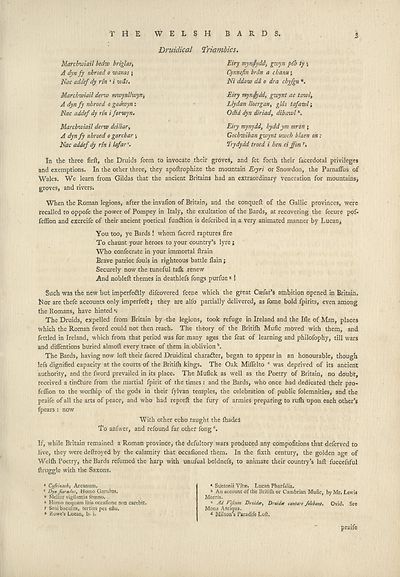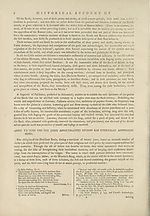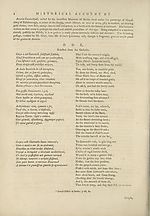Glen Collection of printed music > Printed music > Musical and poetical relicks of the Welsh bards
(17) Page 3
Download files
Complete book:
Individual page:
Thumbnail gallery: Grid view | List view

WELSH BARDS.
3
T H E
Druidical iambics.
Marchwiail bedzv briglas^
A dyn fy nbroed o wanas ;
Nac addef dy tin
1
i ivds.
Marchwiail derw mwynllwyn
i
A dyn fy nhroed o gadxvyn:
Mac addef dy rin i forwyn.
Eiry ?nynJydd
}
gzvyn poo ty 5
Cynnefin Iran a chanu;
Ni ddaw dd 0 dr a chyfgu
u
.
Eiry myndydd, gwynt ae tawl
t
Llydan lloergan, glds tafawl;
Odid dyn diriad
i
dihawl *.
Marchwiail derw deiliar,
A dyn fy nhroed 0 garchar \
Nac addef dy rin i lafar *.
Eiry mynydd, hyddym mron ;
Gochwiban gwynt uwch blaen on:
Erydydd troed i hen ei jfon
r
.
In the three firft, the Druids feem to invocate their groves, and fet forth their facerdotal privileges
and exemptions. In the other three, they apoftrophize the mountain Eryri or Snowdon, the Parnaffus of
Wales. We learn from Gildas that the ancient Britains had an extraordinary veneration for mountains,
groves, and rivers.
When the Roman legions, after the invafion of Britain, and the conqueft of the Gallic provinces, were
recalled to oppofe the power of Pompey in Italy, the exultation of the Bards, at recovering the fecure pof-
feffion and exercife of their ancient poetical function is defcribed in a very animated manner by Lucan,
You too, ye Bards! whom facred raptures fire
To chaunt your heroes to your country’s lyre ;
Who confecrate in your immortal ftrain
Brave patriot fouls in righteous battle flain ;
Securely now the tuneful talk renew
And nobleft themes in deathlefs fongs purfue * !
Such was the new but imperfectly difcovered fcene which the great Cafar’s ambition opened in Britain,
ftor are thefe accounts only imperfeCt; they are alfo partially delivered, as fome bold fpirits, even among
the Romans, have hinted *;
The Druids, expelled from Britain by -the legions, took refuge in Ireland and the Ifle of Man, places
which the Roman fword could not then reach. The theory of the Britilh Mufic moved with them, and
fettled in Ireland, which from that period was for many ages the feat of learning and philofophy, till wars
and diffentions buried almofi: every trace of them in oblivion
b
.
The Bards, having now loft their facred Druidical character, began to appear in an honourable, though
lefs dignified capacity at the courts of the Britilh kings. The Oak Milfelto
c
was deprived of its ancient
authority, and the fword prevailed in its place. The Mufick as well as the Poetry of Britain, no doubt,
received a tindure from the martial fpirit of the times: and the Bards, who once had dedicated their pro-
felfion to the worlhip of the gods in their fylvan temples, the celebration of public folemnities, and the
praife of all the arts of peace, and who had repreft the fury of armies preparing to rulh upon each other’s
fpears : now
With other echo taught the IhadeS
To anfwer, and refound far other fong
d
.
If, while Britain remained a Roman province, the defultory wars produced any compofitions that deferved to
live, they were deftroyed by the calamity that occafioned them. In the fixth century, the golden age of
Wellh Poetry, the Bards refumed the harp with unufual boldnefs, to animate their country’s laft fuccefsful
ftruggle with the Saxons.
5
Cyfrinach, Arcanum.
* Dyn fiaradus. Homo Gamins.
" Melior vigilantia fomno.
* Homo nequam litis occafione non earebit.
y Seui baculus, tertius pes efto.
* Rowe’s Lucan, b. i.
1
Suctonii Vitae. Lucan Pharfalia.
b
An account of the Britifli or Cambrian Mufic, by Mr. Lewis
Morris.
c
Ad Vifcum Druida^ Druid* caviare fold ant. Ovid. See
Mona Antiqua.
^ Milton’s Paradife Loft,
praife
3
T H E
Druidical iambics.
Marchwiail bedzv briglas^
A dyn fy nbroed o wanas ;
Nac addef dy tin
1
i ivds.
Marchwiail derw mwynllwyn
i
A dyn fy nhroed o gadxvyn:
Mac addef dy rin i forwyn.
Eiry ?nynJydd
}
gzvyn poo ty 5
Cynnefin Iran a chanu;
Ni ddaw dd 0 dr a chyfgu
u
.
Eiry myndydd, gwynt ae tawl
t
Llydan lloergan, glds tafawl;
Odid dyn diriad
i
dihawl *.
Marchwiail derw deiliar,
A dyn fy nhroed 0 garchar \
Nac addef dy rin i lafar *.
Eiry mynydd, hyddym mron ;
Gochwiban gwynt uwch blaen on:
Erydydd troed i hen ei jfon
r
.
In the three firft, the Druids feem to invocate their groves, and fet forth their facerdotal privileges
and exemptions. In the other three, they apoftrophize the mountain Eryri or Snowdon, the Parnaffus of
Wales. We learn from Gildas that the ancient Britains had an extraordinary veneration for mountains,
groves, and rivers.
When the Roman legions, after the invafion of Britain, and the conqueft of the Gallic provinces, were
recalled to oppofe the power of Pompey in Italy, the exultation of the Bards, at recovering the fecure pof-
feffion and exercife of their ancient poetical function is defcribed in a very animated manner by Lucan,
You too, ye Bards! whom facred raptures fire
To chaunt your heroes to your country’s lyre ;
Who confecrate in your immortal ftrain
Brave patriot fouls in righteous battle flain ;
Securely now the tuneful talk renew
And nobleft themes in deathlefs fongs purfue * !
Such was the new but imperfectly difcovered fcene which the great Cafar’s ambition opened in Britain,
ftor are thefe accounts only imperfeCt; they are alfo partially delivered, as fome bold fpirits, even among
the Romans, have hinted *;
The Druids, expelled from Britain by -the legions, took refuge in Ireland and the Ifle of Man, places
which the Roman fword could not then reach. The theory of the Britilh Mufic moved with them, and
fettled in Ireland, which from that period was for many ages the feat of learning and philofophy, till wars
and diffentions buried almofi: every trace of them in oblivion
b
.
The Bards, having now loft their facred Druidical character, began to appear in an honourable, though
lefs dignified capacity at the courts of the Britilh kings. The Oak Milfelto
c
was deprived of its ancient
authority, and the fword prevailed in its place. The Mufick as well as the Poetry of Britain, no doubt,
received a tindure from the martial fpirit of the times: and the Bards, who once had dedicated their pro-
felfion to the worlhip of the gods in their fylvan temples, the celebration of public folemnities, and the
praife of all the arts of peace, and who had repreft the fury of armies preparing to rulh upon each other’s
fpears : now
With other echo taught the IhadeS
To anfwer, and refound far other fong
d
.
If, while Britain remained a Roman province, the defultory wars produced any compofitions that deferved to
live, they were deftroyed by the calamity that occafioned them. In the fixth century, the golden age of
Wellh Poetry, the Bards refumed the harp with unufual boldnefs, to animate their country’s laft fuccefsful
ftruggle with the Saxons.
5
Cyfrinach, Arcanum.
* Dyn fiaradus. Homo Gamins.
" Melior vigilantia fomno.
* Homo nequam litis occafione non earebit.
y Seui baculus, tertius pes efto.
* Rowe’s Lucan, b. i.
1
Suctonii Vitae. Lucan Pharfalia.
b
An account of the Britifli or Cambrian Mufic, by Mr. Lewis
Morris.
c
Ad Vifcum Druida^ Druid* caviare fold ant. Ovid. See
Mona Antiqua.
^ Milton’s Paradife Loft,
praife
Set display mode to: Large image | Zoom image | Transcription
Images and transcriptions on this page, including medium image downloads, may be used under the Creative Commons Attribution 4.0 International Licence unless otherwise stated. ![]()
| Special collections of printed music > Glen Collection of printed music > Printed music > Musical and poetical relicks of the Welsh bards > (17) Page 3 |
|---|
| Permanent URL | https://digital.nls.uk/104973969 |
|---|
| Description | Scottish songs and music of the 18th and early 19th centuries, including music for the Highland bagpipe. These are selected items from the collection of John Glen (1833 to 1904). Also includes a few manuscripts, some treatises, and other books on the subject. |
|---|
| Description | The Glen Collection and the Inglis Collection represent mainly 18th and 19th century Scottish music, including Scottish songs. The collections of Berlioz and Verdi collected by bibliographer Cecil Hopkinson contain contemporary and later editions of the works of the two composers Berlioz and Verdi. |
|---|

